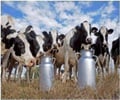A new study has found that newborns with very low birth-weight, who received the milk protein lactoferrin were less prone to develop late-onset sepsis.
A new study has found that newborns with very low birth-weight, who received the milk protein lactoferrin alone or in combination with a probiotic, were less prone to develop late-onset sepsis.
Late-onset sepsis-infections arising after the perinatal period (immediately before and after birth)-mainly occur in the hospital and affect 21 percent of very low birth-weight (VLBW; less than 3.3 lbs) neonates (generally the first four weeks after birth)."Infections are the most common cause of death in premature infants and a major threat for poor outcomes," wrote the authors.
Bovine lactoferrin (BLF), a milk glycoprotein, inhibits the growth of a wide variety of bacteria, fungi, and viruses and has been shown to exhibit even higher in vitro antimicrobial activity than human lactoferrin.
However, it is not clear if lactoferrin can reduce the incidence of sepsis, but in animal tests, the probiotic Lactobacillus rhamnosus GG (LGG) improved the activity of lactoferrin.
Dr. Paolo Manzoni, of S. Anna Hospital, Torino, Italy, and colleagues examined whether oral supplementation with BLF alone or in combination with LGG reduces late-onset sepsis in VLBW neonates.
The randomised trial was conducted in 11 Italian neonatal intensive care units and included 472 VLBW infants who were assessed until discharge for development of sepsis.
Advertisement
The researchers found that overall, late-onset sepsis occurred less frequently in the BLF and BLF plus LGG groups (9/153 [5.9 percent] and 7/151 [4.6 percent], respectively) than in the control group (29/168 [17.3 percent]).
Advertisement
The sepsis-induced risk of death was significantly lower in the two treatment groups. No adverse effects to treatment occurred.
"This study has demonstrated that supplemental BLF, either alone or in combination with LGG, reduces first episodes of late-onset sepsis in VLBW infants," concluded the authors.
The study has been published in the latest issue of JAMA.
Source-ANI
RAS















